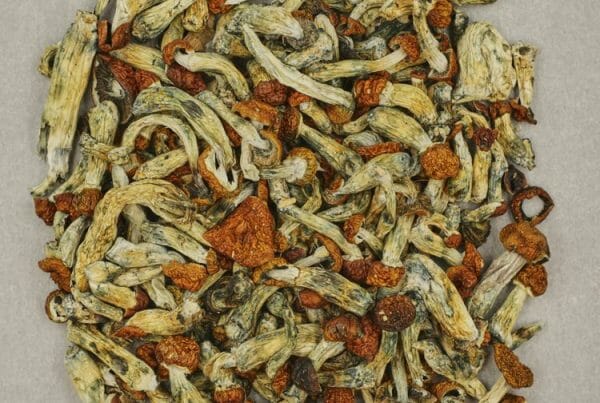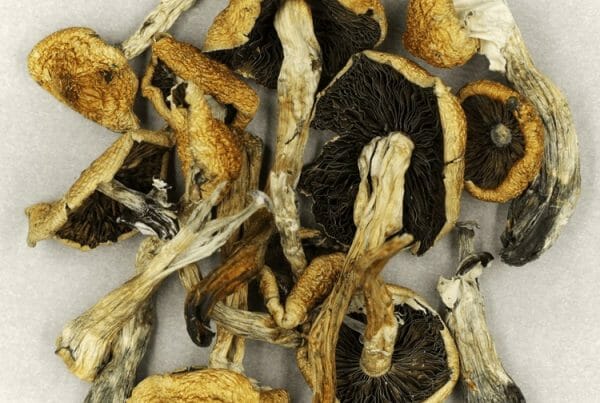In a study about magic mushroom Canada, nearly 8 in 10 believed that psilocybin must be a medical option for distressed patients. Almost 2 in 3 Canadians in the same study agreed that people must legally access psilocybin when needed.
Besides allowing people to access the substance easily, 84.8 percent think the public health system must cover the costs of therapy. Many Canadians believe that psilocybin is a right option, mainly when used to treat end-of-life distress.
Table of Contents

Key Takeaways:
- Canadians from Québec, Ontario, Alberta, and British Columbia consider psilocybin a reasonable medical option for treating end-of-life existential distress.
- Magic mushrooms appear to be safe for treating existential distress.
- Participants in two double-blind trials experienced immediate and lasting benefits, with effects lasting up to six months or more.
Existential Distress
Existential distress, overlapping with concepts like existential suffering, spiritual distress, and demoralization, arises when patients contemplate their mortality. Patients have feelings of helplessness, loneliness, anxiety, and a loss of meaning and purpose. This distress impacts patients with life-threatening illnesses and can lead to a desire to hasten death or consider suicide.
People facing terminal illness or significant life changes are the ones who commonly experience this type of distress. It impacts their mental health and quality of life.
Existential therapy addresses anxiety, depression, grief, loneliness, apathy, despair, identity questions, and feelings of purposelessness and existential dread. It can take numerous sessions and is not efficient for everyone.
The uncertainty of whether such therapy will work is one reason why many seek alternative treatment.
Psilocybin as Treatment Option – Health Canada
Over the last two decades, the initial clinical trials have highlighted the benefits of psychedelic substances in treating complex mental conditions. Psilocybin has rapid and lasting effects in reducing existential distress in end-of-life patients.
Health Canada recognizes the potential benefits of the recommended hallucinogenic mushrooms when conventional therapies fail. The federal government amended the Special Access Program in 2022, where healthcare professionals can request controlled substances for patients.
Canadians For Pro-Psilocybin Access
A study published in the Palliative Care Journal gauges societal attitudes toward psilocybin-assisted therapy for end-of-life care. The study included the following data:
| Methods | 2,800 Canadians from Québec, Ontario, Alberta, and British Columbia participated. 19% had previously used psilocybin (15% in Québec, 26% in British Columbia). |
| Results | 79.3% believe psilocybin-assisted therapy is a reasonable medical choice for treating end-of-life existential distress.63.3% think psilocybin must be part of medical therapy.84.8% support public health system coverage for the therapy.44.2% believe healthcare professionals must administer the substance without the involvement of Health Canada. |
The findings align with surveys from Canada, England, and Australia. The authors noted that their study is unique because it focuses on treating existential distress at the end of life with psychoactive substances.
Why Canadians Support the Use
Many Canadians now accept psilocybin use for treatment, partly due to studies published by prestigious institutions. Another reason for this acceptance is that psilocybin mushrooms for existential distress appear to be safe. Subjects in multiple studies have not experienced severe adverse medical outcomes, such as multi-system organ failure.
| Study | Methodology | Results |
| Johns Hopkins Study | 51 patients received a high dose of psilocybin and a low dose as an active placebo control | Immediate and lasting benefits (up to six months or more). The mystical experiences, characterized by unity and deep emotional insights, are central to their therapeutic effects. |
| New York University Trial | 29 patients randomly received psilocybin or the active placebo niacin | Similar to Johns Hopkins’s findings.Participants who access psilocybin mushrooms report psychological relief and a better outlook on life and death. |
| BMC Palliative Care | Interviewed nineteen respondents (7 physicians, 4 practicing nurses, 4 chaplains, 3 social workers, and one psychologist). Study aimed to determine the attitudes of palliative care clinicians regarding existential distress and psychedelic therapy. | Palliative care providers believe psychedelic-assisted therapy (PAT) holds promise for treating existential distress. |
Patient Experiences
Studies are not the only way to know that psilocybin is effective. Some patient stories reveal that it improved their mental health and overall quality of life.
Yokoi’s Experience
Mio Yokoi, a terminal stage 4 pancreatic cancer patient, describes a transformative journey during her assisted therapy. She visualizes herself on a raft, enveloped by nature and supported by whimsical animals. This experience reassures her of the universe’s interconnectedness and support. It brings her a profound sense of peace and affirmation.
Initially diagnosed, Yokoi felt persistent anxiety and distress despite using conventional mental health support. Psilocybin therapy helped her reconnect with her body and provided her with a tangible sense of love and support. It improved her mental and emotional well-being.
Chrissy
Chrissy, a woman in her 50s, was diagnosed with stage 4 breast cancer that had metastasized to her lungs. At the time of the study, she was a full-time administrative supervisor in the healthcare industry and identified as an atheist. Chrissy was diagnosed with Generalized Anxiety Disorder during screening.
Chrissy experienced significant reductions in anxiety, depression, death anxiety, hopelessness, and demoralization. When asked if her religious or spiritual beliefs had changed since her session, she responded that they brought beliefs to her life and made them real.
Brenda
Brenda, a woman in her 60s, was diagnosed with stage I colon cancer. During the screening, she was identified as hallucinogen-naïve and met the criteria for Chronic Adjustment Disorder with Anxiety.
Brenda reported experiencing her death on two separate occasions during the therapy sessions. She emerged unafraid of death and viewed it as a beautiful part of existence. She recognized the study as a catalyst for beginning her healing process from her childhood trauma. Her data reflected decreased anxiety and death anxiety, along with an increase in spirituality.
Magic Mushroom Canada Product Selection
Access to psilocybin capsules and other products for managing existential distress or other mental health disorders may be currently limited. If ever you require such products, you can find them through reliable online dispensaries.
| Feature | Brazilian Psilocybe Cubensis | Cambodian Psilocybe Cubensis | Melmac Psilocybe Cubensis |
| Origin | Brazil and some surrounding South American countries. | Cambodia, surrounding Angkor Wat Temple. | Connected to Penis Envy mushrooms, popularized in the 1970s. |
| Potency | Moderately potent; ideal for beginners. | Moderately potent; suitable for beginners. | Potent; recommended for intermediate and experienced users. |
| Effects | Mental buzz, mild disorientation, enhanced colour perception, euphoria, spiritual experiences, increased creativity, improved focus. | Energizing and long-lasting high, slight visual alterations, increased creativity, euphoria, smooth physical high, fractal images, happy feelings. | Deep shamanic experiences, vision quests, intense mystical experiences, heightened creativity, focus, social awareness, and mood enhancement |
Relieve End-of-life Distress with Psilocybin Products
Existential or end-of-life distress is a significant burden that many patients endure before their lives end. Treatments for this distress are sometimes ineffective, which led many Canadians to support easier access to magic mushrooms as part of public healthcare. The increased public interest may prompt governing bodies to embrace shrooms as a reliable treatment option. Get your psychedelics and shroom delivery at Zoomies Canada.
Frequently Asked Questions
What will patients expect when undergoing Psilocybin-Assisted Therapy?
Psychedelic-assisted therapy (PAT) requires careful preparation and specific steps to ensure a positive experience. Patients must undergo a thorough evaluation and be mentally ready before consuming the substance.
- Pre-Session Preparation: Evaluation through a comprehensive assessment. The therapist discusses the patient’s goals and expectations to set intentions for the session. The therapist informs the patient of its effects and what to expect during the session.
- The Session: The patients will receive a controlled dosage of the substance. The session occurs in a comfortable, distraction-free environment to promote relaxation and introspection. The therapist provides continuous support and guidance to the patient.
- Post-Session Integration Therapy: Helps the patient process and make sense of their experiences. Follow-up sessions provide ongoing support and counselling to reinforce the insights and changes gained during the therapy.
What are the effects of psilocybin on the brain of distressed patients?
It affects one’s brain by binding to serotonin receptors, particularly the 5-HT2A receptor. This can lead to altered perception, mood, and cognition, which results in profound changes in consciousness, emotional breakthroughs, and new perspectives.
Can anyone undergo psilocybin therapy?
Psilocybin therapy is not suitable for everyone. Patients with specific mental health conditions or existential distress undergo careful screening to exclude those with a history of psychosis.
Related Articles:





